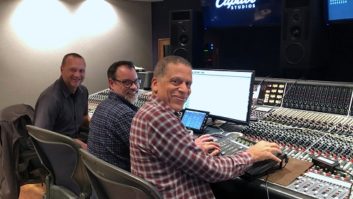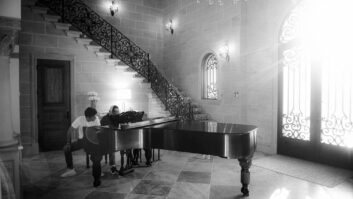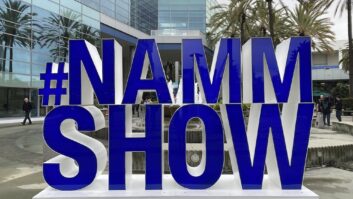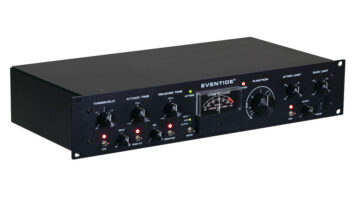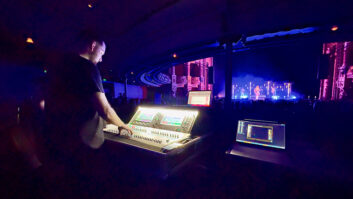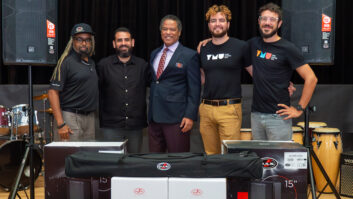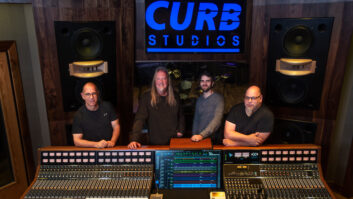Sunderland, UK (September 24, 2019)—It’s been 15 years since The Futureheads burst onto the scene with a self-titled debut album redolent of XTC, Gang of Four, Wire and The Cardiacs, catching the attention of audiences on both sides of the Atlantic with their cover of Kate Bush’s “Hounds of Love.” But four albums and barely 10 years later, the band drifted apart when lead singer and guitarist Barry Hyde was sidelined by chronic mental problems.
Now, fans of the post-punk redux sound of The Futureheads—the name came from a Flaming Lips album title—are rejoicing with the release of Powers on Aug. 30. On the phone from the northeast of England, where the band members live, Hyde reports that the 12 new songs, recorded and self-produced at a local studio, started to come together 18 months ago.
As a condition of reforming for some shows, says Hyde, bass player David “Jaff” Craig insisted they also record a new album. “I can only presume it was because he’d forgotten how much work it is to make an album,” chuckles Hyde, who trained as a chef, became a music teacher during the hiatus and is currently finishing a master’s degree.
Other commitments meant they could meet and rehearse for only three hours a week, meanwhile working on songs individually at home. To speed things up, they decided to write and record in the studio and booked a series of full days at First Avenue Studios in nearby Newcastle upon Tyne. The facility is a home away from home for the band, who recorded numerous B-sides, a large part of their fourth album, The Chaos, and all of their 2012 a cappella album, Rant, at the facility. Hyde also recorded his solo album, Malody, at First Avenue. “It’s cheap and cheerful,” he says.
“I mean this in the nicest possible way, but I think engineers should be seen and not heard,” says Hyde. Studio owner Dave Curle meets the criteria: “He’s a quiet man and has this almost telepathic understanding of how we work and what we’re going to ask for next. Dave’s an expert.”
On those early tracking sessions, he says, “We were just concentrating on getting vibrant drum takes down. Our drummer, my brother Dave, was recording songs he’d essentially never heard. That was challenging.”
The band have certainly recorded elsewhere, including at a farmhouse in the Yorkshire Dales. “That was us living our Bron-Yr-Aur fantasy,” he says, referring to the Welsh cottage where Led Zeppelin worked.
Their debut album was produced partly by Gang of Four’s Andy Gill and partly by Paul Epworth, now a multi-award-winning mega-producer. “We were the first band he ever worked with as a producer in the studio,” Hyde says of Epworth, who was previously a live sound engineer. “His vision very much became the blueprint of that Naughties guitar sound.”
On a more recent visit to Epworth’s The Church studio, he says, “I realized that I really should do something about my lack of recording knowledge, so I started a modest home studio. I feel like the confidence I got from picking up a few basic skills has made me a far more valuable musician.”
Hyde’s home setup includes Apple Logic and Ableton with MuseScore scoring software and EastWest’s Symphonic Orchestra sample library. A Universal Audio Apollo Twin interface, Shure SM7B microphone and M-Audio BX monitors round out the rig.
“It’s efficient for what I need and serves me fine for making demos and for commission work,” which has included songwriting with murderers in a local prison and leading 500 schoolchildren in a song commemorating the anniversary of Apollo 11’s moon landing. “It was my partner, Cindy, who encouraged me to take our spare room for a studio. That thought from her was instrumental to me writing my contributions to this new album,” Hyde says.
“We used a lot of guitars on this album and were not too fussy about everything being pristine and neat, making it more about the songwriting. Each piece has its unique place on the album. We tried to treat each song as a separate musical world, something we’ve always tried to do, but in this case I think we really pushed that, using different tempos, different tonal systems, being very deliberate about chord progressions and scales,” he says. The track “Animus,” for example, constantly changes key.
First Avenue is outfitted with an Allen & Heath mixing desk and a collection of vintage outboard and microphones, including rare AKG D224E dual-element and D200 models, which Curle put on the drums. “Dave Curle is a drummer and has lots of drums, so we experimented,” Hyde reports. All four band members sing: “Everyone used SM7Bs.”
Much of the album’s sonic character comes from the guitars. “We ended up with a methodology for how we arranged the guitars. We’d start off with the basic track, then add multiple clean parts, often very quietly, to enhance certain parts within the guitar arrangements, usually with a little bit of chorus,” he says.
“Also, we added acoustic guitars almost like percussion. You get this swing. After a while, it felt like that was part of the palette we’d developed for this album. The second verse of ‘Listen, Little Man!’ is two Dreadnought guitars, one with standard and one with Nashville tuning, so you get a 12-string image. It was nice to play with that. We did that a lot.”
Guitars went through a variety of amps, including a Fender Deluxe, a Vox AC30 and a small Roland Jazz Chorus, depending on the character required. A variety of stompboxes, including the Harmonic Percolator, a favorite of engineer and musician Steve Albini, delivered top-end boost.
“We also had a Lab Series L5, made by Gibson and Moog, a beautiful valve amp. We even used a Marshall JCM800. I wanted a gnarly rock sound on one song, ‘Headcase,’ which is very dark and fast.” No surprise regarding the choice of microphone: “SM57s all the way. You can’t beat it,” says Hyde.
As for the low end, “We used things like a Fender Rhodes piano to double some of the bass lines, blending it so you can’t hear it as a keyboard. It adds nuance.”
Hyde is obviously pleased that The Futureheads are working together again, his health issues behind him. “We’ve all grown as people and gained a lot of experience and have come back with a far more genuine artistic standpoint.” That said, he laughs, “There’s nothing more sensible than relaunching a band, releasing an album and finishing a master’s degree all within the same few weeks.”
The Futureheads • www.thefutureheads.com
